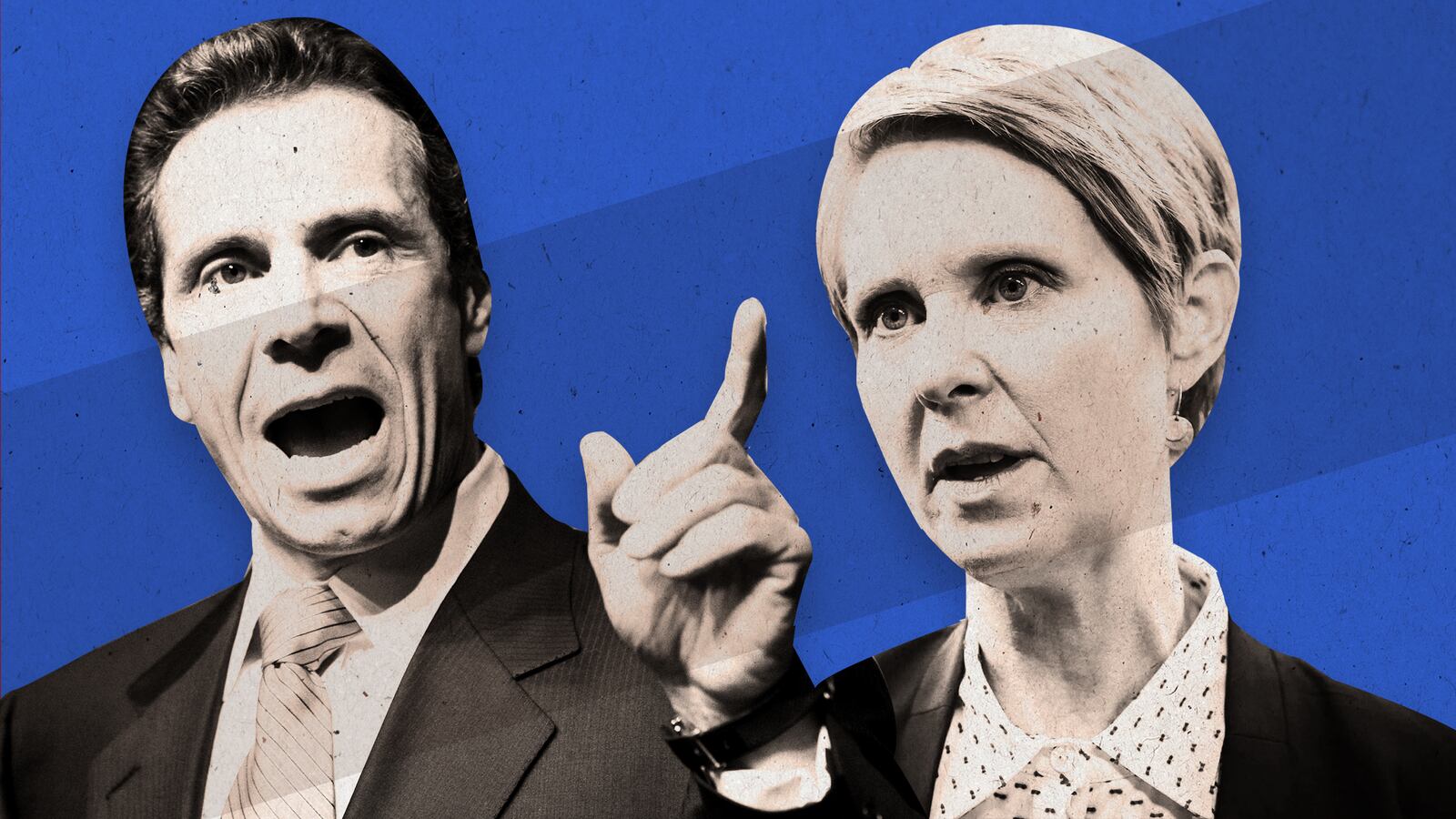The New York Democratic primary gubernatorial debate Wednesday night made clear why Andrew Cuomo hasn’t participated in a primary debate in nearly a decade. When his challenger Cynthia Nixon, expressing the frustration felt by all New Yorkers, reminded Cuomo for the umpteenth time that the state, not the city, controls the mess that is the MTA, Cuomo petulantly pleaded: “Can you stop interrupting?”
What followed was a truly revelatory exchange.
“Can you stop lying?” asked Nixon.
“As soon as you do,” Cuomo replied, tacitly admitting that he does, in fact, lie.
The line punctured a hole in a dynamic we see lately when a longtime incumbent (often a man) faces a progressive challenger (increasingly a woman). Often, the incumbent paints a picture in which the challenger is a dreamer who’s not living in the real world. The incumbent, on the other hand, lives in reality, and bears the burden of knowing what’s possible and what isn’t. He is telling the cold, hard truth.
But in the case of Cuomo v. Nixon, as in many others, that’s simply not true. Cuomo doesn’t live in the real world; he lives in a world in which he can, and often does, claim to have done things he hasn’t.
He admitted as much on Wednesday evening. But the truth is, his campaign has been rife with mistruths.
TV watchers have probably seen the ads touting his so-called “free college” initiative. But the initiative does nothing to help part-time students and doesn’t provide funding for room and board or books. And as Governing magazine pointed out, “it doesn’t pump enough money into the state university system to make up for years of budget cuts,” making it “more about achieving a headline and claiming credit on an issue than really resolving it.”
Underfunding important projects, or seizing a popular progressive cause only to neuter it to the point of inefficacy, is a trend with Cuomo. He made hay over a program to bring HIV/AIDS below epidemic levels in New York, but provided far less funding than he initially promised. He bragged about his gun control initiative, the SAFE Act, and then similarly watered it down. He claims to care about reproductive rights, but has not fought to codify Roe v. Wade into state law to protect New Yorkers if the Supreme Court decision is overturned. Women in New York who need late-term abortions due to fetal issues have to travel out-of-state for healthcare.
The $15 minimum wage Cuomo passed was similar mutilated to be almost unrecognizable to the "Fight for 15" advocates who fought for it. A political consultant who worked on the campaign (and asked not to be identified for fear of retribution by the governor) told me the governor's office "absolutely watered down what could have been a strong minimum wage increase" by adding a six-year phase-in and not indexing the increase to inflation.
"It's a joke," the consultant told me. "By the time it fully takes effect, we'll be pushing for Fight for 22."
Wayne Barrett once asked a question about Donald Trump that could easily be applied to Cuomo: "Does he lapse into his fiercest denial when he just doesn't know?"
Cuomo is at his most inarticulate when caught in a net of his own making. When criticized for his closed-door deal-making, the governor claimed, “Just because something is done behind closed doors doesn’t mean the process isn’t transparent.”
After he was criticized for shuttering the Moreland Commission—an ethics panel he convened to root out corruption in his own state capitol—Cuomo, sounding more like an indignant toddler than a statesman, insisted, "It's my commission. I can't 'interfere' with it, because it is mine. It is controlled by me." (This was after he recorded video upon convening the commission nine months earlier in which he specifically declared nothing was off-limits to this commission—not even his office.) And when U.S. Attorney Preet Bharara's office dropped their investigation into Cuomo, citing "insufficient evidence to prove a federal crime," Cuomo's lawyer's misleadingly read the statement to mean "no illegality here," similarly to how Trump often claims news reports exonerate him and his allies when they have not.
Shockingly, Wednesday’s debate included no questions about sexual harassment, a major issue in Albany—and a major issue for Cuomo, who apparently accepted a $25,000 donation from Harvey Weinstein’s former lawyers days before ordering the New York Attorney General’s office to suspend their investigation into Manhattan District Attorney Cyrus Vance’s handling of allegations against Weinstein.
Cuomo’s spokespersons are claiming that the suspension is meant to avoid interfering with Vance’s new case against Weinstein. But if it’s all above board, why were they so public about calling for the investigation, and so quiet about ordering its suspension three months later?
Here, again, Cuomo’s record has fallen far short of the image he has tried to portray.
At the same time that he purchased Facebook ads bragging that New York’s sexual harassment laws were the strongest in the nation, he ignored women who had experienced sexual harassment and assault while working for the New York state government.
The survivors he’s ignoring have formed a working group and are calling for public hearings on the policy. Cuomo is the only gubernatorial candidate who has not endorsed that call.
It’s unclear what Cuomo thinks he has to lose by listening to women who know from experience what loopholes allow New York lawmakers and government officials to avoid consequences for sexual harassment or assault. Or why he seems so attached to maintaining policies that he’s been told, over and over again, aren’t effective and won’t protect victims.
The current policy that he touts was crafted by him and three other men. There was not a single woman in the room where they hammered out that legislation who was not under Cuomo’s employ. One of the men, Sen. Jeff Klein was under investigation for sexual harassment while helping to craft that sexual harassment policy. (Klein is also running for reelection.)
And yet, Cuomo would have you believe that Nixon is the one who is living in a fantasy land; as if it is simply impossible for a sexual harassment policy to be put together with the input of women; or a minimum wage hike to come into being within the next few years; or money to actually be devoted to combat the AIDS epidemic; or for abortion rights to be codified into state law.
One of the reasons people cite for not wanting to vote for Nixon is the belief that she’ll get trounced in Albany. The reasoning seems to rely on the knowledge that Albany is notoriously, systematically corrupt.
That’s a problem with Albany, not with Nixon. The idea that she couldn’t handle it is a gendered assumption that buys into the Cuomo-constructed notion of Cuomo as realist and Nixon as dreamer, when the truth is, Nixon might be aspirational, but Cuomo is delusional.






